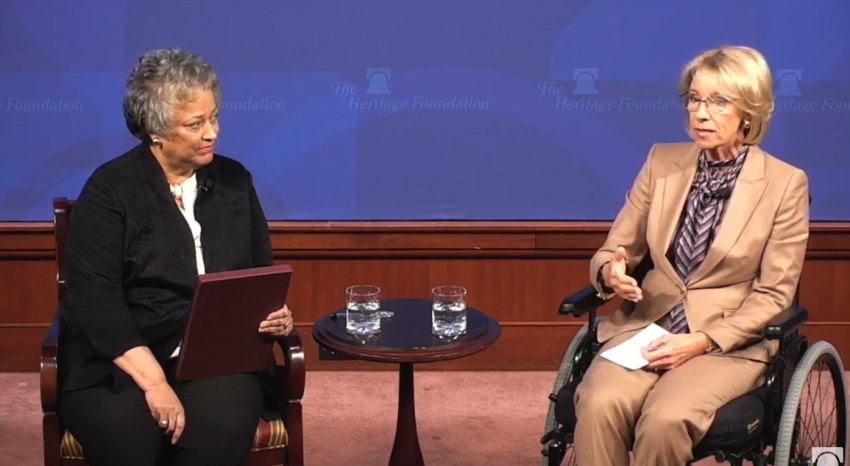Betsy Devos defends DC school choice program, slams teacher unions for blocking progress

Education Secretary Betsy Devos celebrated school choice and the D.C. Opportunity Scholarship Program Wednesday despite a federal analysis showing that low-income students who used vouchers to attend private schools in the nation’s capital under the program showed significantly lower math scores after two years.
“Naturally there have been lots and lots of surveys and different studies done, both on the D.C. program as well as choice programs across the country and everybody wants to constantly refer to the one where students especially in math, showed a little dip after their first two years. Well think about it, if a kid is struggling in [a] school to which they are assigned, they change schools and start something new. Anytime we change anything, it takes a little while to get up to speed,” Devos said in a discussion with Kay Coles James, president of The Heritage Foundation, celebrating the program’s 15th anniversary.
The OSP, also called vouchers, offers scholarships to low-income children in Washington, D.C., to attend a participating private school of their choice. It is funded under the Scholarships for Opportunity and Results Act, and is the only federally-funded voucher program in the country. It was enacted by Congress as part of a three-sector approach encompassing traditional public schools, charter schools and private schools to improve educational outcomes in the district.
Under the program, equal funds are allocated to support traditional public schools, public charter schools, and opportunity scholarships. The OSP ensures that low-income families have the same opportunities as more affluent families to choose among public schools, charter schools and quality private schools. Some 91 percent of participating children are African-American and Hispanic, and the average income for participating families is less than $24,000 per year, the program’s website says.
“All of the studies that have been longitudinal in nature and for students that have been in the program or in choices the longest period of time, they continue to show growth, year over year over year, and I think that is the most important thing in the long run. The preponderance of evidence is really clear — that choice ultimately works for students and works for families and there is clear and convincing evidence that there is too many kids across this country that don’t have the chance to be in the right schools and the right fit,” Devos, who is currently recovering from a pelvis fracture, said.
According to The Heritage Foundation, more than 1,650 children currently use OSP scholarships to pay tuition at participating private schools across the city.
“The reach of the OSP extends beyond our city … the Opportunity Scholarship Program was and remains a key part of the growing private school choice movement. In 2000, there were just 10 private school choice programs in operation across the country. Today, there are 63 private school choice programs operating in 29 states and in the District of Columbia. It has been incredible growth,” James said.
Pointing to satisfaction survey results, Devos, argued that when parents get to choose schools, they are generally more satisfied.
“When kids are in learning environments that work for them, it’s great for them and it’s great for the families. And we see survey after survey show that the satisfaction of parents that have had the opportunity to choose their child’s school is very, very high. They are happy because they are in a place they feel is right for them. They are happy because they feel the school is safe for them and they are happy because of the outcomes and the achievements that their children are demonstrating and doing,” Devos, who is expected to be using a wheelchair for the next three months, said.
The education secretary, who is a longtime supporter of school choice, said the school choice program did not get much support under the Obama administration and lamented that the program was used as a “political football” even though the OSP was established with bipartisan support 15 years ago.
“Education should not be, is not really a partisan issue. It really is reflective of the future of our country. If students today aren’t prepared for what comes next, we’re not going to be prepared as a nation, to compete with the rest of the world. And we know that the most recent polling has shown conclusively that people want to have choices. They want choices for their kids,” Devos said. “Sixty-seven percent of the people in this country, two thirds, support school choice. The only thing standing in the way is the teachers union that have a personal financial vested interest.”



























